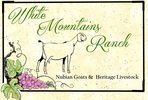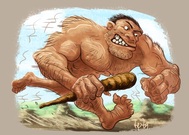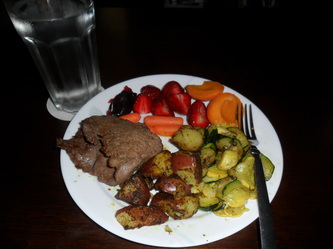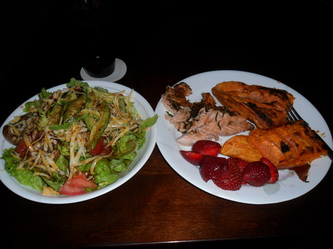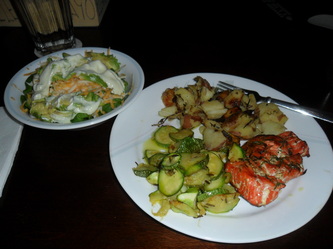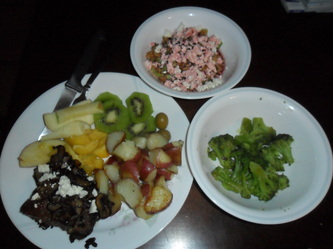What does Going Primal Mean?

Primal Integration is a full-range approach to growth and healing that integrates the natural wisdom of emotional expression with the clarity of cognitive awareness and the grounding of whole person healthcare.
Modalities include:
Modalities include:
- Sleep
- Healthy eating
- Exercise
- Whole life development
- Play
- Sunlight
Our ancestors evolved over millions of years under certain environmental conditions. These conditions (the foods they ate, the amount of sun they got, the sort of movement that was required of them to survive, etc.) shaped their genome. While the world has changed in innumerable ways in the last 10,000 years (for better and worse), the human genome has changed very little and thus thrives under similar conditions. Simply put, if you want a better future you listen to the past. And that’s where a Primal Way of Living come in. Showing you how to direct gene expression toward fat burning, muscle building, longevity and wellness, and away from fat storing, muscle wasting, disease and illness.
Diet
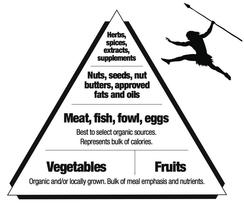
Do you actually know where your food comes from, what hormones it is injected with, or how it was genetically modified? Do you understand what you are putting into your body?
The paleolithic diet (abbreviated paleo or primal), also popularly referred to as the caveman diet, Stone Age diet, and hunter-gatherer diet, and is a modern nutritional plan based on the presumed ancient diet of wild plants and animals that various hominid species habitually consumed during the Paleolithic era—a period of about 2.5 million years duration that ended around 10,000 years ago with the development of agriculture. Paleolithic Era foods are prior to agriculture and animal husbandry.
Centered on commonly available modern foods, the "contemporary" Paleolithic diet consists mainly of fish, grass-fed pasture raised meats, vegetables, fruit, fungi, roots, and nuts, and excludes grains, legumes, dairy products, salt, refined sugar, and processed oils.
We do our best to stick to whole, unprocessed organic foods: meat, eggs, seafood, vegetables, fruits, nuts and seeds. We try to avoid eating things with sugar, grains (yes, whole grains, too), legumes, and trans- and hydrogenated fats, as well as anything packaged or processed. In short, we eat anything that can be hunted or gathered, and try to avoid stuff that’s processed, cultivated, or sealed in colorful plastic packaging. All of the dairy we consume is raw and unprocessed.
We focus on quality sources of protein (all forms of meat, fowl, fish), lots of colorful vegetables, some select fruits (mostly berries), and healthy fats (nuts, avocados, olive oil). Observe portion control (calorie distribution) week to week more than meal to meal. Eliminate grains, sugars, trans- and hydrogenated fats from your diet.
Why Grains are Unhealthy
Grains and Disease
The paleolithic diet (abbreviated paleo or primal), also popularly referred to as the caveman diet, Stone Age diet, and hunter-gatherer diet, and is a modern nutritional plan based on the presumed ancient diet of wild plants and animals that various hominid species habitually consumed during the Paleolithic era—a period of about 2.5 million years duration that ended around 10,000 years ago with the development of agriculture. Paleolithic Era foods are prior to agriculture and animal husbandry.
Centered on commonly available modern foods, the "contemporary" Paleolithic diet consists mainly of fish, grass-fed pasture raised meats, vegetables, fruit, fungi, roots, and nuts, and excludes grains, legumes, dairy products, salt, refined sugar, and processed oils.
We do our best to stick to whole, unprocessed organic foods: meat, eggs, seafood, vegetables, fruits, nuts and seeds. We try to avoid eating things with sugar, grains (yes, whole grains, too), legumes, and trans- and hydrogenated fats, as well as anything packaged or processed. In short, we eat anything that can be hunted or gathered, and try to avoid stuff that’s processed, cultivated, or sealed in colorful plastic packaging. All of the dairy we consume is raw and unprocessed.
We focus on quality sources of protein (all forms of meat, fowl, fish), lots of colorful vegetables, some select fruits (mostly berries), and healthy fats (nuts, avocados, olive oil). Observe portion control (calorie distribution) week to week more than meal to meal. Eliminate grains, sugars, trans- and hydrogenated fats from your diet.
Why Grains are Unhealthy
Grains and Disease
Move Around a lot at a Slow Pace

We know that our ancestors spent an average of several hours each day moving about at what today’s exercise physiologists might describe as a “low level aerobic pace.” They hunted, gathered, foraged, wandered, scouted, migrated, climbed and crawled. This low level of activity prompted their genes to build a stronger capillary (blood vessel) network to fuel each muscle cell, to be able to store some excess food as fat, but also to be readily able to convert the stored fat back into energy. Of course, they did all this without the benefit of paved sidewalks or comfortable shoes. Because every footfall landed at a different angle, every muscle, tendon and ligament worked and became stronger together in balance. Note that they did NOT go out and “jog” at 80% of their MAX Heart Rate for long periods of time as Conventional Wisdom suggests today!
Do some form of low level aerobic activity 2-5 hours a week, whether it is walking, hiking, easy bike riding or swimming. Ideally, and when possible, find time to go barefoot or wear as little foot support as possible. Low-level activity is necessary (especially if you find yourself chained to a desk every day). The combined effect will be an increase in capillary perfusion, fat-burning and overall integration of muscle strength and flexibility.
Do some form of low level aerobic activity 2-5 hours a week, whether it is walking, hiking, easy bike riding or swimming. Ideally, and when possible, find time to go barefoot or wear as little foot support as possible. Low-level activity is necessary (especially if you find yourself chained to a desk every day). The combined effect will be an increase in capillary perfusion, fat-burning and overall integration of muscle strength and flexibility.
Lift Heavy Things
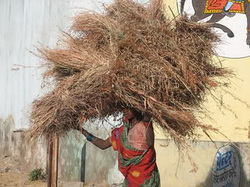
The women carried their babies much of the time, as well as bundles of firewood, or whatever they had gathered, foraged or scavenged. The men carried heavy spears or other tools, they dragged heavy carcasses of animals they had hunted, and they moved large boulders or logs to build shelters. They also lifted themselves into trees or up onto higher ground when escaping from danger or to scout a new route. The biochemical signals created by these very brief but intense muscle contractions generated a slight surge in growth hormone and a reduction in myostatin gene expression, prompting an increase in muscle size and power; particularly fast twitch fibers.
Go to the gym and lift weights for 30-45 minutes, 2-3 times a week. Focus on movements that involve the entire body and in wider ranges of motion – not just on isolating body parts. Emulate the movements of our ancestors: jumping, squatting, lunging, pushing, pulling, twisting, etc. This will stimulate your genes to increase muscle strength and power, increase bone density, improve insulin sensitivity, stimulate growth hormone secretion, and consume stored body fat.
Go to the gym and lift weights for 30-45 minutes, 2-3 times a week. Focus on movements that involve the entire body and in wider ranges of motion – not just on isolating body parts. Emulate the movements of our ancestors: jumping, squatting, lunging, pushing, pulling, twisting, etc. This will stimulate your genes to increase muscle strength and power, increase bone density, improve insulin sensitivity, stimulate growth hormone secretion, and consume stored body fat.
Run Really Fast Every Once in a While
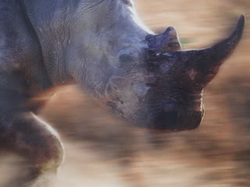
In a world where danger lurked around every corner, your ability to run was a strong indicator of whether you would live long enough to pass your genes down to the next generation. (Note to self: That which didn’t kill Grok made him stronger). Avoiding a charging beast to save your life, or surging forward to catch a different beast for dinner, the net effect was still survival. A combination of the hormonal events that occurred simultaneously and the resultant gene expression within fast twitch muscle made sure that the next time this happened Grok could sprint a little faster.
Do some form of intense anaerobic sprint bursts several times a week. This could be as simple as six or eight (or more) short sprints up a hill, on the grass, at the beach… or repeated intense sessions on a bicycle (stationary, road or mountain bike). These short bursts also increase HGH release (HGH is actually released in proportion to the intensity (not the duration) of the exercise).
Do some form of intense anaerobic sprint bursts several times a week. This could be as simple as six or eight (or more) short sprints up a hill, on the grass, at the beach… or repeated intense sessions on a bicycle (stationary, road or mountain bike). These short bursts also increase HGH release (HGH is actually released in proportion to the intensity (not the duration) of the exercise).
Get Lots of Sleep

Our ancestors got plenty of sleep. Even after the discovery of fire, it wasn’t as if they stayed up all night partying. From sunset to sunrise it was safer to huddle together and rest. Long days of hunting and gathering and otherwise working hard for every bite of food also required sufficient time to repair and recover. Studies of modern hunter-gatherers suggest it wasn’t necessarily always an uninterrupted nine or ten hours, either. It’s likely that they slept together as families or as small tribes, keeping a watch out for predators, breast-feeding the baby or just dozing in and out throughout the night. Growth hormone and melatonin were the major hormonal players. Of course, the occasional afternoon nap was also available when the urge hit, with no guilt about what else they really should have been doing.
Get plenty of quality sleep. Our lives are so hectic and full of things to do after the sun goes down that it’s often difficult to get enough sleep. Yet sleep is one of the most important factors in maintaining good health, vibrant energy and a strong immune system.
Get plenty of quality sleep. Our lives are so hectic and full of things to do after the sun goes down that it’s often difficult to get enough sleep. Yet sleep is one of the most important factors in maintaining good health, vibrant energy and a strong immune system.
Play
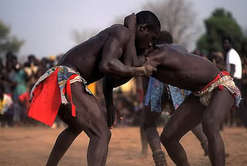
Just like in modern times, all work and no play made Grok a dull boy. Hunter-gatherers have always generally worked fewer hours and have had more leisure time than the average 40-hour-plus American worker. Once the day’s catch was complete or the roots, shoots, nuts and berries had been gathered, our ancestors spent hours involved in various forms of social interaction that we might categorize today as “play.” Young males would chase each other around and wrestle, vying for a place higher up in the tribe social strata. The males might also practice spear- or rock-throwing for accuracy or chase small animals just for sport. Young females might spend time grooming each other. To the extent that play was considered enjoyable, the net effect was to solidify social bonds and to prompt the release of endorphins and to mitigate any lingering stress effects of life-threatening situations.
Spend some time each week involved in active play. In addition to allowing you to apply your fitness to a real-life situation, play helps dissipate some of the negative effects of the chronic stress hormones you’ve been accumulating through the week. Whether organized sports or something family fun, just do it!
Spend some time each week involved in active play. In addition to allowing you to apply your fitness to a real-life situation, play helps dissipate some of the negative effects of the chronic stress hormones you’ve been accumulating through the week. Whether organized sports or something family fun, just do it!
Get Some Sunlight Every Day

Cavemen weren’t really men (or women) who lived their lives in caves all the time. Most of the day, they were in the great outdoors pursuing their various survival tasks. Regular exposure to sun provided lots of vitamin D, an all-important vitamin which they could not easily obtain from food and which their bodies could not manufacture without direct sunlight.
Contrary to the “Common Wisdom” dispensed by dermatologists (who suggest you shun the sun), the Primal Blueprint would insist that you get some direct sunlight every day. Certainly not so much that you come close to burning, but definitely enough to prompt your body to make the all-important vitamin D and to support the mood-lifting benefits. A slight tan is a good indicator that you have maintained adequate Vitamin D levels. Natural sunlight also has a powerful mood-elevating effect, which can enhance productivity at work and in inter-personal interactions.
Contrary to the “Common Wisdom” dispensed by dermatologists (who suggest you shun the sun), the Primal Blueprint would insist that you get some direct sunlight every day. Certainly not so much that you come close to burning, but definitely enough to prompt your body to make the all-important vitamin D and to support the mood-lifting benefits. A slight tan is a good indicator that you have maintained adequate Vitamin D levels. Natural sunlight also has a powerful mood-elevating effect, which can enhance productivity at work and in inter-personal interactions.
Avoid Trauma
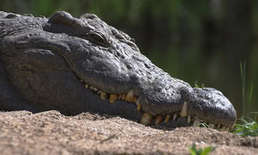
Our ancestors required an acute sense of self-preservation matched with a keen sense of observation. Always scanning, smelling, listening to the surroundings, on the watch for danger, aware of what immediate action needed to be taken, whether it was running from a saber-tooth tiger, dodging a falling rock, eluding a poisonous snake, or just avoiding a careless footfall. Remember that a twisted knee or a broken ankle could spell death to anyone who couldn’t run away from danger. In fact, it was probably trauma (or a brief careless lapse in judgment) that was most responsible for the low average life expectancy of our ancestors, despite their otherwise robust good health. Avoid trauma and there was a very good chance you could live to be 60 or 70 – and be extremely healthy and fit. Modern day hunter gatherers maintain strength and health often well into their 80's and 90's.
Eliminate self-destructive behaviors. These concepts are self evident to most people (wear seat belts, don’t smoke or do drugs, don’t dive into shallow water) yet so many of us live our lives oblivious to impending danger. Develop a keen sense of awareness of your surroundings.
Eliminate self-destructive behaviors. These concepts are self evident to most people (wear seat belts, don’t smoke or do drugs, don’t dive into shallow water) yet so many of us live our lives oblivious to impending danger. Develop a keen sense of awareness of your surroundings.
Avoid Poisonous Things

Man’s ability to exploit almost every corner of this earth was partly predicated on his ability to consume vastly different types of plant and animal life. But moving into a new environment and trying new foods posed a danger that the new food might contain potent toxins. Luckily, our liver and kidneys evolved to handle most brushes with novel-but-slightly-poisonous plant matter – at least to keep us alive anyway if the stomach didn’t regurgitate it first. Our keen senses of smell and taste also helped us sort out the good from the bad. The reason we have a sweet tooth today (dammit) is probably an evolved response to an almost universal truth in the plant world that just about anything that tastes sweet is safe to eat.
Avoid exposure to chemical toxins in your food (pesticides, herbicides, chemicals, etc) and on your skin. But also try to avoid the hidden poisons in foods like sugars, grains, processed foods, trans and hydrogenated fats, and mercury in certain fish.
Avoid exposure to chemical toxins in your food (pesticides, herbicides, chemicals, etc) and on your skin. But also try to avoid the hidden poisons in foods like sugars, grains, processed foods, trans and hydrogenated fats, and mercury in certain fish.
Use Your Mind
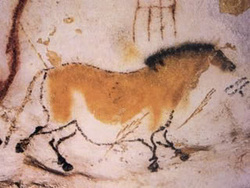
Obviously, one of the most important things that separate man from all other animals is our intellectual ability. The rapid increase in the size of our brains over just a few thousand generations is the combined result of a high-fat, high protein diet (see rule #1) and a continued reliance on complex thought – working the brain out just like a muscle. Hunter gatherers all around the world have developed language, tools and superior hunting methods independently. The fact that some haven’t entered the industrial age doesn’t mean they don’t possess the same ability to process information rapidly and effectively ~ try living in a jungle where you need to catalog thousands of different plant and animal species, knowing which can kill you and which can sustain you. Use it or lose it!
Exercise your brain daily as our ancestors did. Be inventive, creative, and aware. If your work is not stimulating (or even if it is), find time to read, write, play an instrument and interact socially.
Exercise your brain daily as our ancestors did. Be inventive, creative, and aware. If your work is not stimulating (or even if it is), find time to read, write, play an instrument and interact socially.
This list is very general, designed simply to allow you to understand that everything our ancestors did can benefit us as well, except that we can do it having fun, enjoying every aspect of the lifestyle, and without worrying about our survival! These behaviors, what foods you eat, and what exercises you do, all allow you to find ways to let your genes recreate you in the healthiest, fittest way possible.
This Primal Blueprint courtesy of Mark's Daily Apple.
